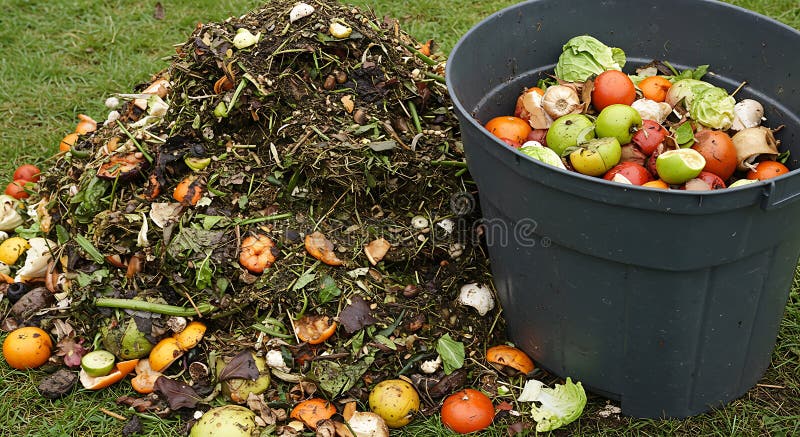
From Scraps to Garden Gold: Unlock the Power of Home Composting
Do you ever feel a pang of guilt as you toss those coffee grounds, veggie peels, or eggshells into the trash? It's hard not to when you realize the sheer volume of food waste generated in our homes. In fact, according to the EPA, food waste comprises over 24% of the material reaching landfills. It doesn’t have to be this way! Imagine instead that you could transform all those kitchen scraps into something truly valuable – a rich, dark, fertile soil amendment that your garden will absolutely thrive on. Many people assume composting is complicated, or worse, smelly, but it doesn't have to be.
In this post, you'll discover easy-to-implement composting methods suitable for any space, transforming your kitchen scraps into a garden's best friend. We'll break down the process, debunk the myths, and empower you to start creating your own "garden gold" from what was once considered waste. Get ready to unlock the power of home composting and watch your garden flourish!

Why Compost? Understanding the Benefits
Composting is far more than just a trendy buzzword; it's a fundamental practice that benefits our environment and our gardens in countless ways. It's a commitment to closing the loop in our food system, returning valuable nutrients back to the earth.
Here's why composting should be an essential part of your sustainable living journey:
- Reduced Landfill Waste: When food waste ends up in landfills, it decomposes anaerobically (without oxygen), producing methane, a potent greenhouse gas that's significantly more harmful than carbon dioxide. By composting, you divert organic materials from landfills, reducing methane emissions and helping to combat climate change.
- Improved Soil Health: Compost is a powerhouse of nutrients. It enriches the soil with essential elements like nitrogen, phosphorus, and potassium, which are vital for healthy plant growth. Furthermore, compost improves soil structure, making it easier for roots to penetrate and access water and nutrients. It also enhances water retention, reducing the need for frequent watering, especially important in drought-prone areas. Not to mention, compost is essential to regenerative agriculture and increasing carbon sequestration in soil!
- Natural Fertilizer: Forget about expensive and often harmful chemical fertilizers! Compost is a sustainable and free alternative, providing plants with a slow-release source of nutrients that they can readily absorb. This promotes stronger, healthier plants that are less susceptible to diseases and pests.
- Ecosystem Support: Compost improves the soil ecosystem by attracting beneficial microorganisms that help the plants thrive, naturally.
- Saves You Money! Who doesn’t love saving a little cash. Composting reduces waste disposal fees and reduces the amount of fertilizer you need to purchase for your garden.
Composting is more than just reducing waste; it's an investment in a healthier planet and a thriving garden for generations to come.
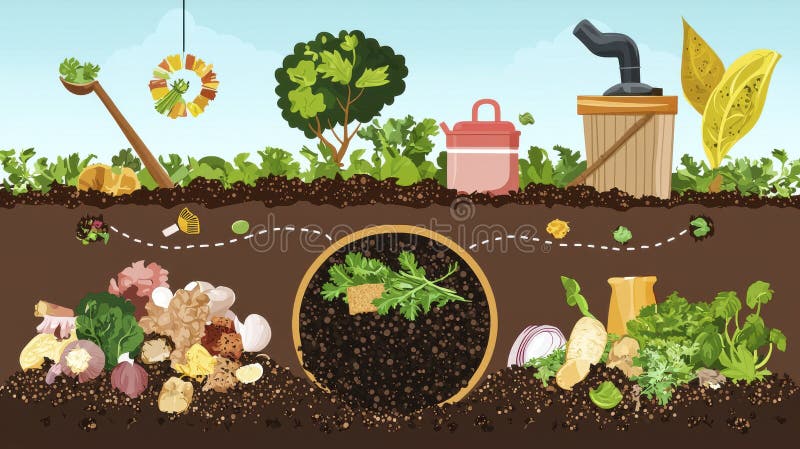
Compost Your Way: Exploring Different Methods
The beauty of composting is that there's a method to suit every lifestyle and space. Whether you have a sprawling backyard or a cozy apartment, you can find a composting system that works for you.
Let's explore some of the most popular composting methods:
Traditional Backyard Composting (The Pile Method)
The classic compost pile is a simple and effective way to transform yard waste and food scraps into valuable compost. Here's how it works:
- Layering: The key to a successful compost pile is layering "greens" (nitrogen-rich materials) and "browns" (carbon-rich materials). Greens include food scraps, coffee grounds, grass clippings, and vegetable peels. Browns include dried leaves, shredded paper, cardboard, and sawdust. A good ratio is roughly 3 parts browns to 1 part greens.
- Optimal Conditions: Compost thrives in a moist, aerated, and warm environment. Keep the pile damp like a wrung-out sponge. Turn the pile regularly (every week or two) to provide aeration and speed up decomposition.
- Troubleshooting: Foul odors often indicate a lack of oxygen or too much nitrogen. Add more brown materials and turn the pile more frequently. Slow decomposition can be caused by a lack of moisture or a poor carbon-to-nitrogen ratio. Adjust accordingly.
- Suitable For: Larger yards with ample space for a compost pile. Ideal for processing large volumes of yard waste.
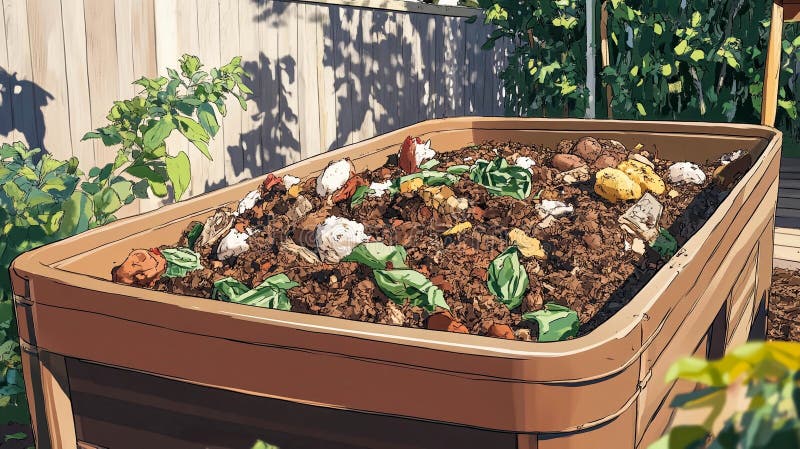
Compost Tumblers
Compost tumblers are enclosed containers that make turning the compost pile easier and more efficient.
- Advantages: Faster decomposition due to frequent turning, rodent prevention, and a neater appearance.
- Suitable For: Small to medium-sized yards. A good option for those who want to avoid the mess of a traditional compost pile but are willing to rotate the tumbler.
- Tips: Choose a tumbler with good ventilation and a sturdy construction. Be sure to keep an eye on moisture levels, as tumblers can dry out quickly.
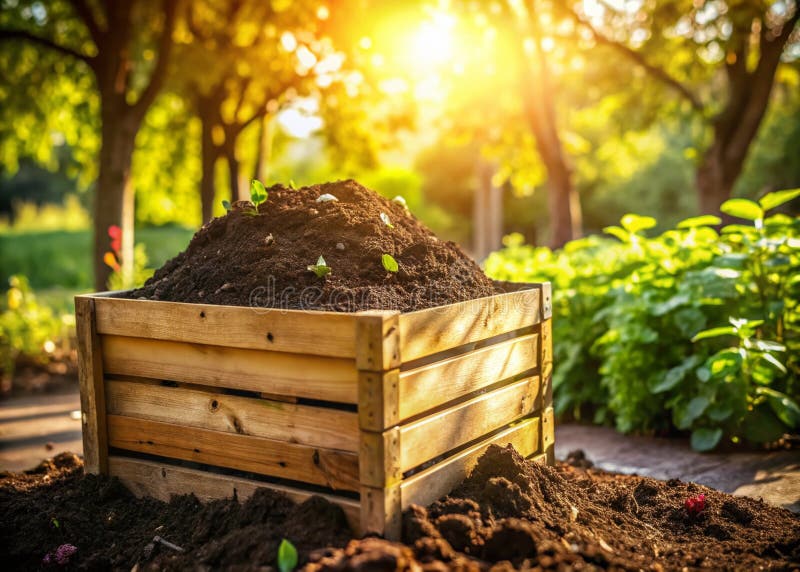
Vermicomposting (Worm Composting)
Vermicomposting harnesses the power of worms to break down food scraps into nutrient-rich compost.
- Process: Red wiggler worms (Eisenia fetida) are the stars of vermicomposting. These industrious creatures consume food scraps and excrete "worm castings," a highly beneficial compost that's perfect for seedlings and container plants.
- Setting Up a Worm Bin: You can purchase a pre-made worm bin or build your own using plastic bins. The bin should have drainage holes and adequate ventilation. Bedding materials include shredded paper, coconut coir, and peat moss.
- Suitable For: Small spaces, apartments, and indoor composting. A great option for those who want to compost food scraps year-round, regardless of weather conditions.
- My Vermicomposting Story: When I first started vermicomposting, I was nervous about the smell and the upkeep. I'd heard horror stories of fruit flies and slimy messes. But I did my research, built a simple worm bin, and started feeding the worms small amounts of food scraps. To my surprise, the process was incredibly easy and virtually odor-free. Within a few months, I had a steady supply of rich worm castings that my plants absolutely loved. It's now a staple of my composting routine!
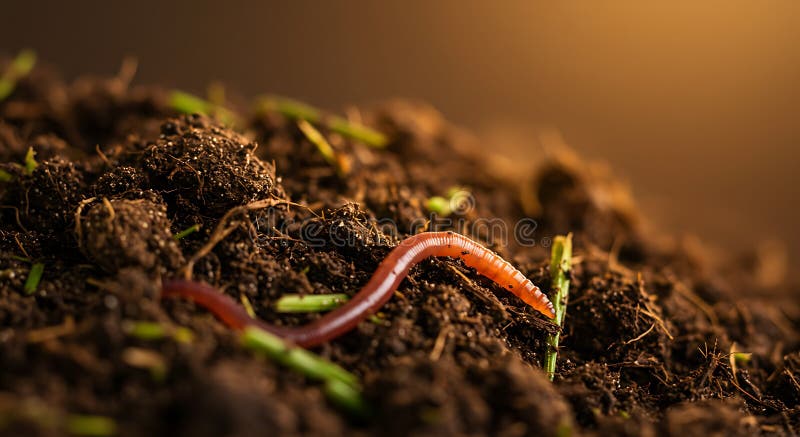
Bokashi Composting
Bokashi composting is an anaerobic (without oxygen) fermentation method that uses inoculated bran to break down food scraps.
- Process: Food scraps are layered in a Bokashi bucket with Bokashi bran, which contains beneficial microorganisms. The bucket is sealed to create an anaerobic environment, and the scraps ferment over a period of several weeks.
- Benefits: Can compost all food scraps, including meat and dairy, with minimal odor. The fermented scraps are then either buried in the garden or added to a compost pile for further decomposition.
- Suitable For: Small spaces, tackling all types of food waste, and pre-composting before adding to a traditional compost system.
- Tips: Press down on the food scraps to remove air pockets. Drain off the liquid "Bokashi tea" regularly, diluting it with water and using it as a fertilizer for your plants.
Choosing the right composting method depends on your space, lifestyle, and the types of waste you generate. Experiment with different methods to find what works best for you!
I regret I can't create a Bokashi compost image for upload.
Composting Dos and Don'ts: A Simple Guide
To ensure a successful and odor-free composting experience, keep these simple guidelines in mind:
Dos:
- Chop food scraps into smaller pieces for faster decomposition.
- Maintain a proper carbon-to-nitrogen ratio (roughly 3:1).
- Turn the compost pile regularly to provide aeration (except for Bokashi).
- Keep the compost moist but not soggy.
- Add beneficial microbes like compost starters to the pile.
Don'ts:
- Compost diseased plants or meat scraps (except Bokashi).
- Add excessive amounts of oily or fatty foods.
- Let the compost pile dry out completely or become waterlogged.
- Put persistent weeds with seeds in the compost, as seeds will germinate in the garden.
Harvesting and Using Your Homegrown Compost
After weeks or months of patient composting, the moment of truth arrives: harvesting your homegrown compost.
- Identifying When Compost is Ready: Finished compost should be dark brown or black in color, with a crumbly texture and a rich, earthy smell. You should no longer be able to recognize the original food scraps or yard waste.
- How to Harvest Compost: Use a garden fork or shovel to sift through the compost pile, separating out any large, undecomposed debris. You can use a compost screen to make this process easier.
- Using Compost in the Garden:
- As a soil amendment: Mix compost into planting beds and containers to improve soil fertility and structure.
- As a top dressing: Spread a thin layer of compost around established plants to provide them with a slow-release source of nutrients.
- As a component of potting mixes: Add compost to potting mixes to improve drainage and water retention.
- As a "compost tea": Steep compost in water to create a nutrient-rich tea that can be used as a foliar feed for plants.
- Seasonal Considerations: Apply compost in spring and fall for optimal results. Spring applications provide plants with a boost of nutrients as they begin to grow, while fall applications help to improve soil health over the winter months.
I regret I can't create a compost spreading image for upload.
Learn to recognize finished compost and utilize its nutrient-rich properties to create a thriving garden that will be the envy of the neighborhood!
Join the Compost Revolution
Composting is more than just a sustainable practice; it's a way to connect with nature, reduce your environmental impact, and grow a healthier, more abundant garden. It’s a way of turning something you normally discard into something you treasure and rely on. By embracing the power of home composting, you can transform your kitchen scraps into "garden gold," enriching your soil, nourishing your plants, and contributing to a more sustainable future.
What are your favorite composting tips? Share them with our community in the comments below! I look forward to hearing your ideas, questions, and stories!